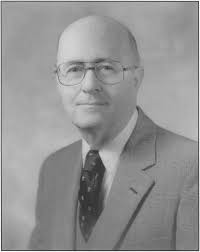Awards
- Honorary Degree - 1975
- D.S.
- Doctor of Science
- Commencement
- Bloomington, Indiana
- Presenter: John William Ryan
- National Academies - 1953
- American Association for the Advancement of Science

Early in 1951 the Department of Zoology of Indiana University initiated a search for a promising young practitioner of the newly emerging discipline of biochemical embryology. That search culminated in the selection of James David Ebert, at that time Instructor in Biology at Massachusetts Institute of Technology.
Born in Bentleyville, Pennsylvania, Ebert received his early education in the Pennsylvania public schools and then went on to earn the A.B. degree at Washington and Jefferson College. Upon discharge as an officer in the Navy in 1946, he entered The Johns Hopkins University where he received the Ph.D. degree in 1950. His published research on the biochemical differentiation of the contractile proteins in the emerging heart of the chick embryo brought him to the attention of Indiana zoologists who persuaded him to join our faculty. Continued exquisite and pioneering researches, coupled with vigorous and authoritative teaching, led to promotion to Associate Professor in 1954. In February 1956 he accepted the post of Director of the renowned Department of Embryology of the Carnegie Institution of Washington in Baltimore, a post he has held to this day.
Of all the areas of biology, none is more challenging than the realm of embryonic differentiation - the realm of mechanisms whereby, under the guidance of the hereditary outfit, there emerge from a single-celled beginning integrated multi-cellularity, diversified tissues, organismic wholeness. Starting with the immunological techniques delineating the patterns of synthesis of cardiac proteins, Dr. Ebert has opened and pursued many new paths through the maze of differentiation. He has contributed new insight into the embryonic development of the mechanisms of immunity; he has combined the methods of embryology and virology in studying the transfer of information between cells and the mechanisms underlying the malignant transformation of cells by tumor viruses; he has investigated the phenomenon of growth regulation; and he has inaugurated a study of the ionic regulation of cell replication. A list of some 145 research reports and critical reviews dealing with the basic nature of cell differentiation and cellular interactions attest to his efforts.
Dr. Ebert himself has said that his interest in "development" has not been limited to the laboratory. He has also been concerned with the development of individuals and institutions. Thus, concomitantly with the directorship of the Carnegie laboratory, he has served as Professor of Biology at The Johns Hopkins University and Professor of Embryology at The Johns Hopkins School of Medicine where his talents as a teacher have been exercised. Collaboration in the authorship of two undergraduate-level textbooks reflect this concern with teaching. For five years, also, he directed the course in Embryology at the Marine Biological Laboratory at Woods Hole, Massachusetts, an institution of which he is Trustee and now President. His directorship of the Carnegie laboratory has been notable in two respects: recruitment of creative young investigators who have flourished under his leadership and, reflecting the work of these investigators, a shifting of the laboratory's activities to sophisticated analytical pursuits.
Honors and significant offices have come to Dr. Ebert in multiplicity. He has held many lectureships both here and abroad. He has been elected to the American Philosophical Society, the National Academy of Sciences, and the American Academy of Arts and Sciences and is a member of numerous national and international professional societies. He has served as President of the American Institute of Biological Sciences (1963), President of the Society for the Study of Development and Growth (1957-58), and President of the American Society of Zoologists (1970.) Withal, he has held directorships, trusteeships, or chairmanships of assorted bodies and is, or has been, a member of the editorial boards of prominent professional journals.